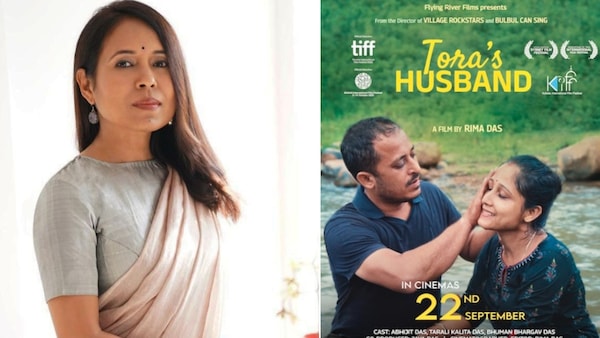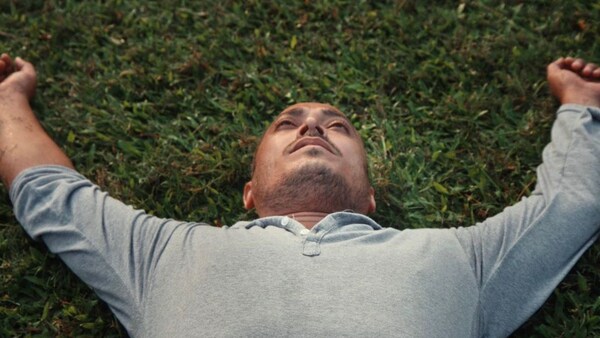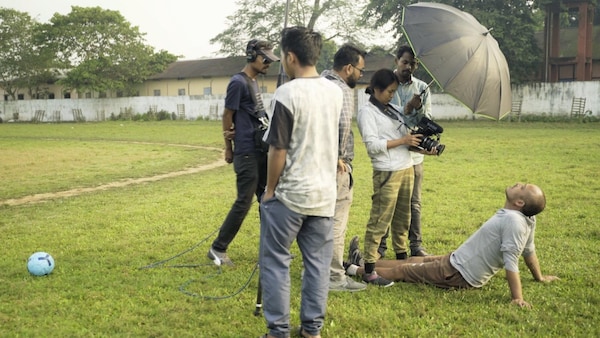Exclusive | Tora’s Husband director Rima Das: ‘Rain and rivers have prominent roles in my films’
The National Award-winning Assamese filmmaker’s latest movie - Tora’s Husband - is currently running in the cinemas

Rima Das’ movie Tora’s Husband premiered at the Toronto International Film Festival in September
Last Updated: 10.32 AM, Oct 03, 2023
Contemplative cinema is not rare in India. But very few filmmakers have managed to masterfully dovetail a minimalist canvas with a throbbing storyline, punctuated by some extraordinary performances. National Award-winning Assamese filmmaker Rima Das has made a mark in that genre. Her name splashed across headlines when her film Village Rockstars became India’s official entry to Oscars 2019. Known for her realistic movies - where you can almost smell the rain, dream a dream and feel an emotion - the independent writer-director’s latest film Tora’s Husband finally released in India last week, after it had its world premiere at the prestigious Toronto International Film Festival earlier in September.
Set in Rima’s hometown (Chhaygaon), the plot revolves around a married couple, who struggle to navigate the devastating impacts of the Covid-19 pandemic. As the world slowly escapes the clutches of lockdowns and restrictions, a local businessman and his wife increasingly reel under financial constraints, uncertainties and a failing relationship. It’s a story of humanity, love and resilience amid adversities. Featuring real-life couple Abhijit Das and Tarali Kalita Das as the lead characters, Tora’s Husband was earlier also screened at the Busan International Film Festival and the Kolkata International Film Festival.
Also read: Tora’s Husband review: Rima Das returns with a tenderly aching tale of resilience amid adversities
In an exclusive interview with OTTplay, Rima opens up about her style of filmmaking, the advantages of working with non-actors, her take on generative AI and the emergence of OTT, her upcoming projects and more. Excerpts:
Q. After the festival runs abroad, Tora’s Husband is finally being screened at home turf. Are the responses meeting your expectations?
A. Definitely, I was looking for a positive response. But with bigger films releasing around the same time, it’s challenging for an independent team like ours to create a window. It’s a struggle, but I’m happy that although my audiences, compared to that of a blockbuster film, is limited, their responses are unexpectedly positive. They are all saying how they can relate with the characters. Viewers have liked the male and female perspectives in the film, and the fact that one is not judgmental of the other. They are getting the nuances and the layers of the narrative. So, they can see the many things within - be it about humanity, nature, relationships and even the children’s world. They are seeing it like a holistic experience.
After watching the film, people have been sharing notes with me and writing small reviews on their Facebook [now Meta], Instagram and Twitter [now X] pages. And I’m glad about that, because this has been my most challenging project so far, and we have really put in a lot of hard work into making this film. It was a very difficult journey. And after all the festival runs outside the country, when you get a positive response from the people of your own place, it’s definitely a celebration for us.
Q. Nature and sensory elements seem to play a prominent role in your films. Is that how you perceive the world?
A. Tora’s Husband as well as my other stories are all inspired by my own life experiences, my observation and imagination. These narratives are somehow connected to what I long for to see in a film or read in a book or hear in a song. As human beings, we all want to get love and support, and look for some kind of a philosophy to guide us in life. I always do that when I am in trouble. I have learned many things from nature - how nature is always giving; how by being nice to each other, we can reduce our problems and anxiety; and how we can create less conflict in society and within our families. That’s how I look at life and tell stories through my films.
French director and screenwriter Agnès Varda, who was a prominent filmmaker of her time, used to always say that she wouldn’t make a film just to make another movie, but to keep cinema alive. Village Rockstars, Bulbul Can Sing and Man with the Binoculars: Antardrishti - these are all movies from my own production house - Flying River Films. When I’m making a film, there are a lot of challenges, efforts and hard work involved in it. So, I would like to do something to keep cinema alive. Even after 10 years, when I watch these films, I must feel good about them… That okay this is what I created and the audience took something from it that will stay with them forever. That is what I try to do actually.
In real life, I have seen that to be a better person and for my own personal growth - in terms of my physical, mental, emotional and spiritual well-being - there should be a balance. That’s the reason you see so much rain and rivers in my films. When I’m making a film, humans are not the only characters in it. I give equal importance to nature and everything else. They are part of the universe. If you have seen the dog in Tora’s Husband or the goat in Village Rockstars, they are equally important in the narrative. That is how I look at life and that is why I try to bring these elements into my films too.
Q. Do you deliberately give preference to non-professional actors in your films or do they just happen to be?
A. It’s nothing like that. There are two-three factors at play here. First, I am someone who has been into acting since my childhood days, which was also the reason I went to Mumbai at one point to fulfil my dreams. I never had any kind of fear or hesitation that a non-actor cannot act or I cannot train a non-actor. It’s quite a spontaneous decision for me. If you look at my first feature film - Man with the Binoculars: Antardrishti - apart from legendary Assamese actor Bishnu Kharghoria, the movie also featured a few other professional actors.
That said, the limitation of resources and money is an important factor here. The only tool I had while making my first film was my camera. And I had to wrap up everything within a span of 24 days. Of course, I am passionate about my craft, but the means to realise my dreams is still very limited.
Later, when I met the youngsters who feature in Village Rockstars, I started working on the other aspects of filmmaking as well (from cinematography to editing) by myself. In the process, I started mixing professional and non-actors in the cast. Any character that I feel will be better enacted by a professional actor, I cast accordingly. If you look at Bulbul Can Sing, it features Pakija Begam, while Tora’s Husband has a cameo by Moloya Goswami. Both of them are renowned actresses. My upcoming projects - one in Mumbai and the other in Australia - mostly feature professional actors.
A lot also depends on the kind of movies one is making. For me, no acting is acting. I am not making a period drama or such. My films are mostly inspired by mundane real-life experiences, so they require a more realistic style of acting. The advantage of casting non-actors for such films is that they are already natural in their approach. All I need to do is tell them how to emote or deliver a dialogue.
With non-professional actors, I also have the privilege of time. Tora’s Husband was shot for almost two and a half years, Village Rockstars took me three years to make and Bulbul Can Sing was filmed over a period of 12 months. I can never afford such long schedules with professional actors. The amount of rain, flood and natural beauty that you see in my films cannot be captured within a limited timeframe. Even this time around, I have waited in my hometown for two months just to catch the rain in its full glory. Everytime there’s a downpour, I run outside with my camera. The weather in Assam is quite unpredictable. Sometimes, I have to wait for nearly 15 days just to capture a good sunset. So, it’s all about what the story demands, understanding and co-ordinating with my style of filmmaking. I am okay to work with both professional and non-actors as long as these prerequisites are aligned.
Q. You are someone who also writes your own scripts. What’s your take on generative AI, do you see it as a boon or a bane?
A. As long as I believe in god, nature and the universe, I feel that human emotions or human creativity cannot be replaced. Every time I’m connecting with people, I’m connecting with nature. As a human being, I’m changing; I’m always experiencing something new.
We have grown up in a joint family in Assam, but every time I am back here, I discover and experience something new about my mother and my brother, Abhijit Das (who plays the title character in Tora’s Husband). That’s how mysterious the world and its people are. Even those whom you have known for years feel strange sometimes. That’s the mystery about human beings. Like it’s said in Greek philosophy that ‘you don’t step into the same river twice’, because that’s how it is. That’s how things are changing.
In Tora’s Husband, despite all the pain and uncertainties amid a global pandemic, as a writer I have tried to add a glimmer of hope and create a sense of balance in the narrative. In terms of generative AI, yes things are going to be difficult if such tools come into use. I have also heard of cloning and similar stuff. But we shouldn’t lose hope just yet. Remember that human emotion and our connectedness with nature come above all of it.
Q. Lately, the Assamese film industry is seeing an emergence of independent cinema (from Bhaskar Hazarika’s Aamis, Kenny Basumatary’s Local Utpaat to Monjul Baruah’s Anur: Eyes on the sunshine, among others). How do you perceive the growth?
A. A lot of filmmakers in Assam are trying their best to keep independent cinema alive. But in order to ensure sustained growth, we also need to develop a taste among the audience, particularly the younger lot. During a recent visit to a college in the state, the students were asking me about film appreciation courses. When I travel outside India, I see film festivals that are specially curated for children and the youth. These are the kind of changes we need to make here to ensure that the new generation is also aware of world cinema. It’s a long process, but we need to make a start. Of course, with social media at their fingertips, today’s youngsters are more used to making or watching reels on their phones. In such a fast-paced world, watching a film like Tora’s Husband may seem to require patience. So, it’s important that we create avenues for them to get exposure to these kinds of films too. It’s not that they wouldn’t enjoy it. There are many who have not seen movies other than the commercial films. So, it’s important to create that community and atmosphere where different movies are watched and appreciated.
Even a simple Instagram or Facebook post can do wonders, when it comes to spreading the word about a good film. Of course, compared to a blockbuster, we don’t have the charm and business strategy to promote an independent project. So it’s important for us to build that community of people who love us and support our films. They are our true strength. Otherwise, honestly speaking, it’s a difficult journey for independent filmmakers.

Q. Do you think the OTT space can help in this regard?
A. Yes, definitely. Both my previous films - Village Rockstars and Bulbul Can Sing - are accessible to a larger audience because they are streaming on Netflix. OTT is better than a platform like YouTube because, once you put up a film on this site, it stays there until you remove it, and you don’t really want to do that. But when it comes to OTT, once it’s removed from one streaming platform, you can approach another one. OTT platforms have become a standard space for independent filmmakers like us to showcase our films for a longer period of time to audiences across the globe.

Q. Do you plan to do a web series in the future? Also, tell us about your upcoming projects?
A. Yes, why not. I don’t really have any limitations as such. As long as the story is good and those with whom I am collaborating understand my vision and style, I am okay to do a documentary or even a commercial project. The only thing is that I wouldn’t want to compromise with my style and sensibilities.
Speaking of upcoming projects, I am working on Village Rockstars 2, which is from my own production house. Then, there is My Melbourne, on which I am collaborating with noted filmmakers Imtiaz Ali, Kabir Khan and Onir. It’s an anthology film, but the stories are interconnected. All the four directors are working on different themes. Apart from that, there is another anthology project in Mumbai that I am a part of. This will be for OTT.

 Premium
Premium